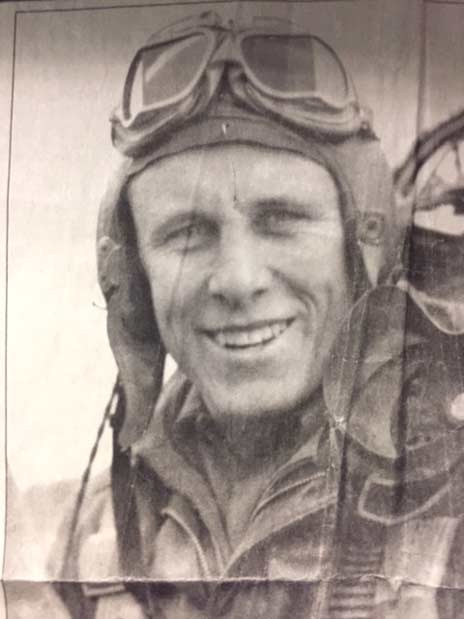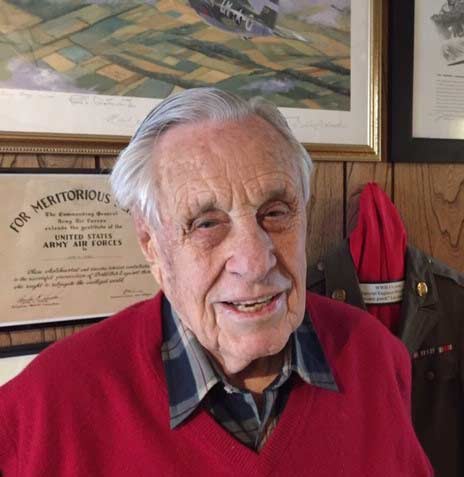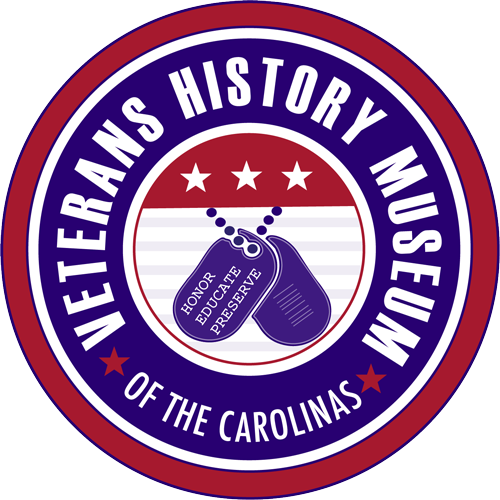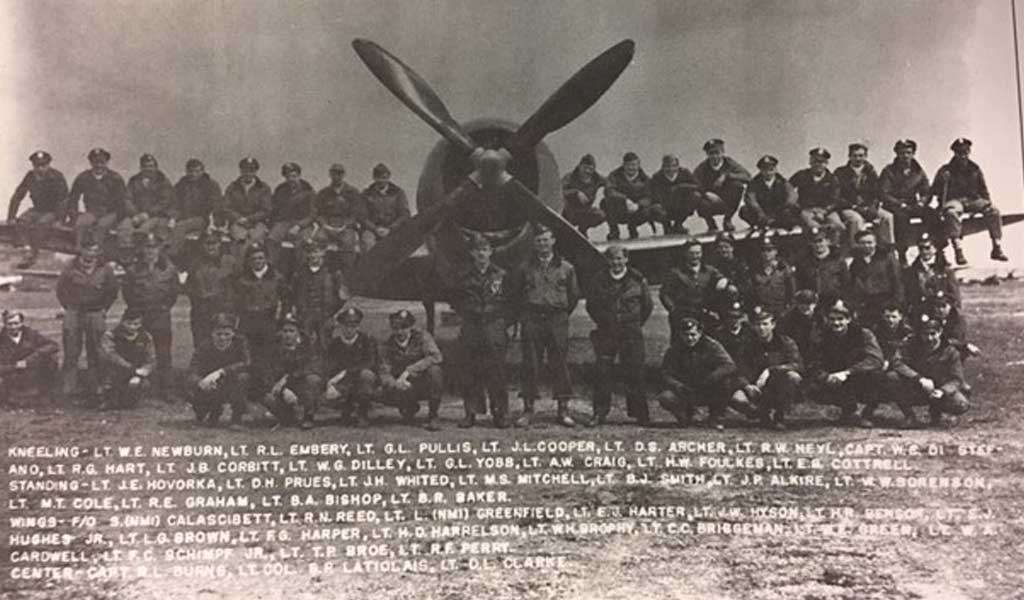By Ed Cottrell
Edwin Cottrell served in the Army Air Corps from August 1942 through 1945, then enlisted in the Air Force Reserves in 1950 and completed 28 years.
His father, Dr. Elmer Cottrell, served in the U.S, Army in World War I. Also serving in the U.S. Army in World War I, his father-in-law received two Purple Hearts.
On April 3, 2000 at age 98, Ed Cottrell told his story:
“I was born in Oklahoma City, Oklahoma on January 17, 1922. When I was six months old, my father and mother moved the family to Slippery Rock, Pennsylvania, where he was a teacher.
“While I was in college, I met my wife, Millie, while we were freshmen. We went together all through college.
“My military career started in the summer of my sophomore year. The government offered any students interested in getting a pilot’s license to enroll in their CPT (college pilot training) program. I got 30 hours in a Piper Cub and got my pilot’s license.
I Wanted to Be a Pilot
“Pearl Harbor took place and in August 1942 I got my draft notice. I wanted to be a pilot and joined the Army Air Corps. I went to flight school in Chico, California, flying the Vultee Vibrator, the PT-13. It shook all over, but it was a very reliable plane.


“I was assigned to Luke Field in Phoenix, Arizona for advanced training, flying the AT-6, the Texan. We had five hours of flying in the P-40 Fighter. Upon graduation as a 2nd LT, I went back to Slippery Rock. There Millie and I got married and spent two weeks before I was to report to Wendover Field in Utah.
“At Wendover Field, I found the most beautiful aircraft I’d seen—a brand new P-47 Thunderbolt. We got a lot of aerial gunnery experience, did a lot of night flying, formation flying, dive-bombing and strafing runs.
In Europe Flying the P-47
“We were sent to England where we were assigned to the 48th Fighter Group, 493rd Fighter Squadron, at Cambrai Airfield, just outside of Paris. We flew formation, dive-bombing attacks, and strafing attacks without firing guns.
“In late September 1944, we moved to St. Trond, Belgium. It was a beautiful airfield with 10,000-foot runways. On December 6th, the weather was very bad. The 9th Army was in close pursuit of the German military. We were called on a very, very rainy, cloudy day with no more than 200 feet visibility, to go skip-bomb a soccer field where the Americans were on one side and the Germans were on the other side. There was pretty much a stalemate.
“I flew wingman to our squadron commander, Major Latiolais. He led 12 of us on this mission where we were 200 feet above the ground, flying at over 300 miles an hour, until we came to the little town of Jullich, Germany. We were required to come in over the American troops, maybe 30 or 40 yards across the field to skip-bomb the Germans on the other side. We made two or three passes, got a lot of ground fire, and were successful in dropping our bombs. The Americans were able to move forward and push the Germans back.
“Upon the return to our base we found out that almost every plane had a lot of bullet holes in it where the small ground fire had hit the planes. The P-47 was such a good plane, that didn’t faze it at all. Our 493rd Fighter Squadron got the Presidential Citation for that operation. Major Latiolais did a tremendous job of leading us on that mission, where some of the time we were on instruments and some of the time actually at treetop level.”
Close Encounter with ME-109s
“On December 17th we were on a mission to locate some tiger tanks which were just east of Cologne in a wooded area, on their way to Bastogne. We found out the Germans had broken through and the Battle of the Bulge was taking place.
“Again, I was flying wing to our commander. We located the tiger tanks in the woods and went down on a dive-bombing mission. Major Latiolais was the first plane down. I was the second plane down. We dropped our bombs. As we pulled up, we ran into a group of ME-109 German Luftwaffe planes.
“On our pullout, on our way up, I noticed an ME [Messerschmitt]-109 coming down at one o’clock toward my squadron commander. I called to him that there was a bandit at one o’clock. The 109 shifted a little bit and the next thing I knew I felt this big blast and a 20mm cannon apparently hit my plane. All of a sudden, there was oil all over the windshield and I couldn’t see anything. I was on an upward slope.
“I opened the canopy, got on the radio to my commander and said I’d been hit and was heading west and going to fly the plane as far as I could. The plane sort of kicked out but it chugged along at about 120 miles an hour with oil flying out all over my windshield.
“I looked out on one side and there was a German 109. I looked out on the other side and there was another 109. They crisscrossed behind me and I thought I was going to be shot down. But they came up and pulled in right next to me. They flew with me back to the bomb line where they used their thumbs and first fingers to make a little circle and peeled off. That was the signal they were leaving me, ‘Good luck and God bless’ without shooting me down.
“I kept going. I had no idea where I was. My radio still worked. I asked anybody that could hear if they knew where A-92 field was. A voice on the radio said, ‘You’re not very far from it. Turn 90 degrees and you should run into it.’
“I found out I was south of the airfield. It was strange territory because we never landed at A-92 except when we came in from the north. Just as my plane was ready to touch down at the airfield, the engine froze over. I had to make a dead-stick landing and rolled to a stop.
I Kissed the Ground
“When I got out of that plane, I kissed the ground because I was a very fortunate person. I could’ve been shot down. The engine could’ve quit. A lot of things could’ve happened. But I came out the best anyone could have under that situation.
“I lost one of my roommates that day, 2nd Lt. Art Sommers. He was a graduate of the University of Southern California. He got shot down. I didn’t see him go down, but he didn’t come back from the mission. We found out later that they found his plane and he had been killed.”
Battle of the Bulge
“On New Year’s Day, 1945, right during the Battle of the Bulge, the Germans had surrounded Bastogne. We were 17 miles away from there. We had been told that if the Germans broke through, we would probably be prisoners of war.
“The day before New Year’s Day we were told all but 12 of the planes would be flown out to another airfield. They were going to leave 12 planes with 12 pilots. The 12 pilots were going to be the least experienced ones. On New Year’s Eve, we were told to get rid of all our personal items—burn them and keep only what we needed—our dog tags. No pictures.
‘We went to bed. At four o’clock in the morning I was told to get up; I was going to be the lead pilot on runway alert. Runway alert is nothing more than four planes at the end of the runway, engines running. If the radar picked up any incoming, we were able to take off and go intercept them.
The Germans Hated our B-17s and B-24s
“Without warning, eight Focke-Wulf 190s came in at ground level, below the radar, and came right over where we were sitting, to the middle of our airfield. There was a B-17 that was burned out and a B-24 that was burned out. They were sitting there waiting to be scrapped. The Germans didn’t know that, of course. The Germans hated B-17s and B-24s because those were the planes that were bombing all their factories.
“The FW-190s went right to that B-24 and B-17 with their machine guns going. But they didn’t drop their belly tanks. As they came to the end of the field and pulled up to make another pass, our anti-aircraft guns hit most of the 190s. Two of them were not hit and they came around to make another pass. The first of the 190s was on his dive down. He kept going down and down. He didn’t pull out and he crashed at the end of the runway. The other plane kept going and shooting at the B-24 and the B-17.
“We went out to where the pilot was lying with his plane in flames and found out that he had a bullet in the middle of his forehead. He didn’t look to be any more than 17 years old. We found out later that all the American airfields up and down the bomb line were hit at the same time that day. The German Luftwaffe took a tremendous loss.
“On that day when I was on runway alert, our squadron went on a mission. Another of my best friends and roommate was shot down and killed. His name was 2nd Lt. Ted Smith, from Wenatchee, Washington.
“From January 1 on, our biggest concern in any missions that we had, was the flak that came from the anti-aircraft gun and the small arms fire from the people that we were dive-bombing and strafing.
“The German air force, what was left of it, was primarily used to attack our bombers that were used to bomb the factories all over Germany.
“The Americans broke through then and got the Germans retreating from Bastogne. Starting in the middle of January, the 9th Army started pushing the Germans back. As the 9th Army moved, we moved from then until May. We took off and landed on metal strips that the engineers put down in farm fields. When we landed, the mud would come up between the metal strips. When we were ready to move, thee engineers took those metal strips and moved them up to the next area.
“We just lived out of houses right near the airfield, wherever there was anything available for sleeping. They were empty either because people had fled from the Germans, the Germans had lived in them and they left, or Jewish people were herded away and killed.
The War in Europe Ended
“Then in May, the 48th was down below Munich. I flew my last mission, my 65th mission, out of Nuremberg. Then the war was over in June. Those people who had 65 or more missions, if they wanted to, could go home. If not, they would be going with the 48th Fighter Group which was going to Japan. I chose to go home because I had a little daughter that I hadn’t seen. I was discharged on July 24.
At Home After the War
“I pursued a career in teaching and coaching: health and physical education, football, basketball, and baseball. While living in Beaver, Pennsylvania, I got my master’s degree at University of Pittsburgh. In the summer, I taught driver training and did some painting on the school building, anything to keep money coming in. At that time, we had one daughter and another one on the way. I went to Penn State on a graduate assistantship, earning $145.00 a month. I also pumped gas, delivered mail, and worked for the recreational program during the summers.
“I joined the Air Force Reserves to make a little extra money and still serve the country. When the Air Force Academy was being developed in Colorado Springs, I was assigned to go around to high schools and explain to kids and guidance counselors what the academy was about, what it was like to go to the academy, and get them interested in becoming cadets. I told them how difficult it was and the discipline that was required, so that if they came to the academy, they didn’t wash out. I stayed in the reserves for 28 years and retired.
“I took a job in Hershey, Pennsylvania at Milton Hershey, at an orphan school for boys, as Director of Athletics. After three years, I went to West Chester State College where I taught swimming and coached tennis, football, baseball, and golf, and taught some classroom subjects. Eventually I started teaching in the graduate school and became the Associate Dean. I did that until I retired at age 57.
“I worked for the National Golf Foundation, visiting elementary, junior high, and high schools promoting the game of golf. I started my own golf school, conducting golf clinics all over the world for the National Golf Foundation. I spent time in Holland, Japan, and all over the United States teaching golf. I became friends with Jack Nicklaus, Greg Norman, Johnny Miller and many well-known golfers. I’ve had a great career.
“Millie and I lived in Florida and Pinehurst, N.C. before moving to Hendersonville. She had worked as a physical education, health, and dancing teacher in many schools over the years. She and I got to work at the same schools sometimes.
“We have two daughters, Carol and Susan. We’re celebrating our 76th wedding anniversary on April 21, 2020.”
Talking About the War
About the years after World War II, Cottrell said, “For a long time, I didn’t talk about the war. I wanted to forget it. And then, about 15 years ago, we were at one of our squadron reunions, talking about how the country was different now.
“Someone said, ‘We never talked about our military experience, but maybe we need to, because this country needs to get back to what it was back during World War II, when the country was in trouble and everybody pitched in. There was no bickering and no questions about what we were going to do.’
“Our country was in trouble and whatever people were asked to do, that’s what they did. If you weren’t able to join the fighting, you worked in the factories. You took care of helping each other out. You did rationing, whatever was needed, to make sure the United States survived. That’s what this country needs to do now.
“So at that reunion, we all said that if we were ever asked, we would talk about our military experiences. That’s why I talk about what we went through in order to preserve the freedom of this country, to keep us from speaking German or Japanese. If Hitler had been successful, he wouldn’t have stopped at anything. Thank the Lord we stopped him.”


I am happy to see this photograph published. My dad is kneeling, Lt. W. E. Newburn. He was a P-47 pilot during WW2, with the 493rd.
Thank you for your service and for sharing your experience. A good friend of mine, John Clay out of Laramie Wyoming also flew 65 missions in P-47s as part of the 48th Fighter group but I am not sure which squadron. All the more important to me, however, as my father was an Army Lt with the 84th infantry, part of the 9th Army both on the northern side of the Bulge and then all the way into and through to Hanover Germany. I am sure my father often thanked those guys flying above for the support they lent to his infantry platoon.
John Clay and I graduated from Luke Field Class 44D. We were very good friends.He was in the 493rd squadron with me.. Were roommates
John Clay was in my squadron 493rd and was my roommate at St.Trond Belgium
Sadly, John clay passed away August 7th, 2021. I’m sure he would have liked to have been in contact with you. He spoke fondly of his times flying p-47s. He described how the Germans used smoke to confuse Pilots and how he attacked armored units with the 50 caliber machine guns by ricocheting the Slugs into the engine compartments. He was a fascinating man and I miss him
John Clay was a very good friend of mine. We were roommate at St Trond Belgium
Glad I met him yesterday during a visit to the Hurtgen Forrest area (Germany). I think he was a very happy man after he and the other veterans left towards Cologne.
Mr. Cotrell,
Thank you so much for sharing your story. It means more to me than I can say, for two reasons especially. The first is that your former roommate and good friend, Ted Smith, was my uncle. Though I never knew him, as I was born in Dec. of 1945, my mother his older sister loved him dearly. She talked about him all the time and I feel as though I knew him. My second reason is that you love our country. You shared how you wish we could return to the way it used to be when Americans helped one another when we were in trouble and did what was needed to make sure the US survived. I’m saddened at the state of our country (and our world) in these days. My prayer is that people will turn to God for help in this time of great need. Thank you for your service.
Doc
Great to see that you are doing well and to finally hear about your service in ww11.All of your ex students and golf team members couldn’t of had a better role model than you. Thanks for your service and for you being there in my life.
I am current 493rd in England and would love to hear more. Would it be possible to get into contact?
Légion d’Honneur some days ago… Congratulations Mr. Cottrell ! I am preparing a paper/several articles concerning the airfield of St.-Trond (my town) 1940-45 from Horst 309 (Luftwaffe night fighters) to 48th and 404th FG and 386th BG. Your story (1944 dec. 17) will be mentioned.
Frank Decat
historian